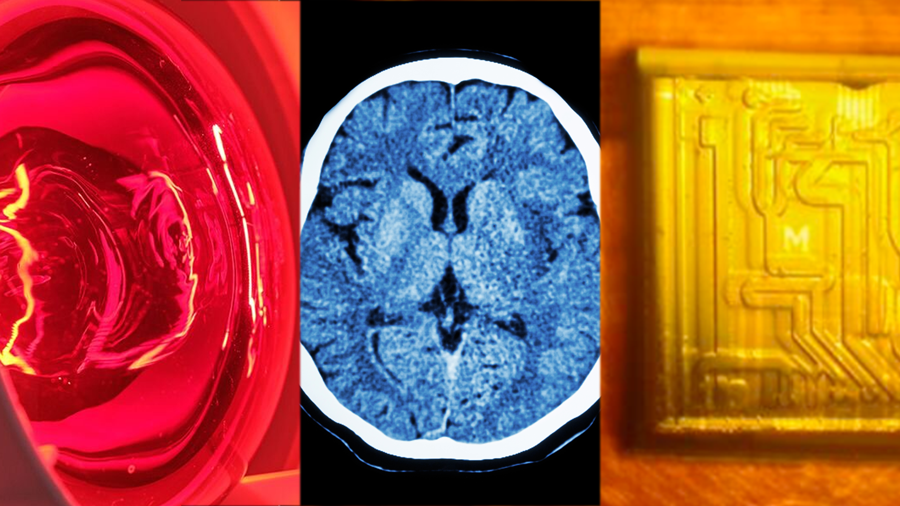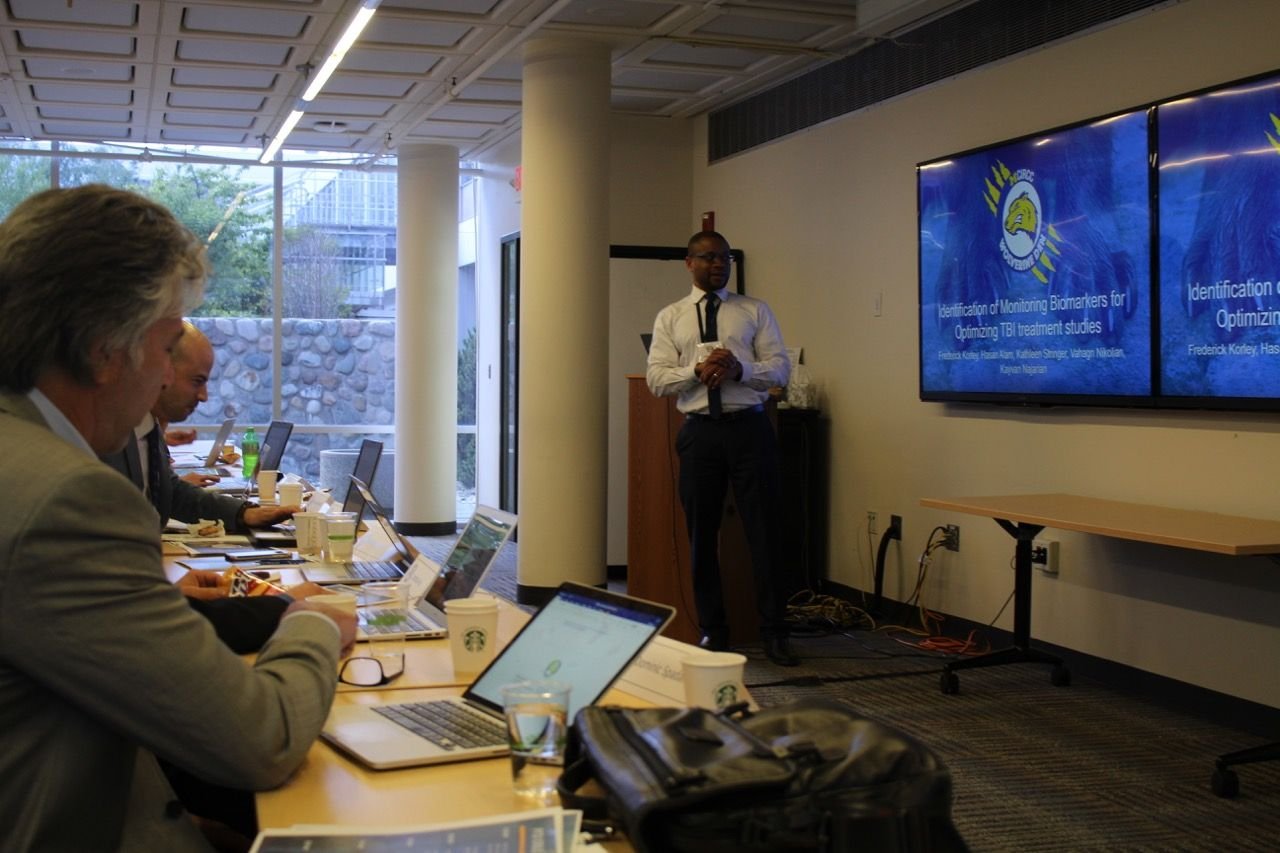Department of Defense Funds Trio of Traumatic Brain Injury (TBI) Innovations Initiated Through U-M Weil Institute Grand Challenge
Images courtesy of Shutterstock (left; center) and TBI microfluidics chip team (right)
High-risk research enables high-impact solutions as the Department of Defense looks to Weil Institute teams for tomorrow’s TBI therapies.
Contact:
Kate Murphy, Marketing Communications Specialist, Weil Institute
mukately@umich.edu
ANN ARBOR — The Summer of 2022 is off to a roaring start for traumatic brain injury (TBI) research as the U.S. Department of Defense (DoD) awards funding to not one… not two… but three teams from the Max Harry Weil Institute for Critical Care Research and Innovation at the University of Michigan. Totaling over $4 million, the grants will propel the continued development of diagnostic and therapeutic solutions poised to transform TBI care—a victory that the teams’ leaders say would not have been possible without the initial support they received through the Weil Institute’s research development and funding program, the Massey TBI Grand Challenge.
“Typically, you can’t approach a funding agency like the DoD and say, ‘I have a great idea,’ and have no proof-of-concept,” said Frederick Korley, MD, PhD, Associate Professor of Emergency Medicine and Scientific Director for Traumatic Brain Injury at the Weil Institute. “That sort of work can’t begin without start-up funds. You need someone to take a chance on your idea and provide that initial support, essentially de-risking it for further funding.”
"The Massey funding is what allowed us to get this far this fast and to test technology that probably wouldn’t have been funded by other mechanisms at such an early stage in development."
Joseph Wider, PhD
Research Assistant Professor, Emergency Medicine and Molecular & Integrative Physiology
Dr. Korley is the principal investigator on two of the recently awarded DoD grants. The first team will work in partnership with Dr. Mark Burns, Professor of Chemical Engineering at the University of Michigan, to build a microfluidic chip that assesses TBI severity at the point-of-care by measuring biomarkers of brain injury in the patient’s blood. As small as a credit card, the chip will enable quick and accurate analysis of TBI even in low-resource settings where conventional devices would be difficult, if not impossible, to deploy. Dr. Korley’s second team is developing a biomarker-enhanced algorithm that will guide the use of computed tomography (CT) scans during the evaluation of TBI. Their end goal is to incorporate this algorithm into a comprehensive approach to managing TBI at U-M and across the country.
“The support from the DoD will enable us to build a very robust algorithm by providing funding to study a greater number of patients, and to build a web-based tool for improving the algorithm over time,” said Korley. “It will also allow us to add more capabilities to the microfluidic chip, which will need to be as accurate as conventional devices and be able to function regardless of the outside temperature. The device will also be simple enough to be used by non-laboratory personnel.”
The third DoD-funded project is led by Weil Institute members Joseph Wider, PhD, and Thomas Sanderson, PhD, a research assistant professor and an associate professor, respectively, in the Departments of Emergency Medicine and Molecular & Integrative Physiology. Their approach to transforming TBI care focuses on mitigating secondary brain injury—the period after the initial injury in which cellular, chemical, tissue and blood vessel changes contribute to further impairment of brain function. Drs. Wider and Sanderson are building a device that non-invasively delivers doses of infrared light into the brain to mitigate mitochondrial dysfunction, a process that plays an important role in cell death during secondary brain injury.
“The DoD is funding an outcome study to test the efficacy of this therapy in large animal models, which will help us work out the best dose and timing,” said Dr. Wider. “As infrared light passes through tissue, the amount of light decreases exponentially, so we have to get creative in order to get the therapy into the brain.” The team sees this infrared light therapy as having potential applications in settings such as the military, where the system could be integrated into a standard helmet to provide non-invasive neuroprotection to service members around the world.
A Launchpad for Success
As the three teams’ projects emphasize, current strategies for the diagnosis, monitoring, and treatment of TBI are largely limited in that many are invasive, resource-demanding, and difficult to deploy in more austere environments. The teams’ solutions for addressing these challenges run the gamut from diagnostics to devices to algorithms to therapeutics, yet they all share a common thread: their journeys to the DoD were fueled in part by the specialized resources provided through the Weil Institute’s Massey TBI Grand Challenge.
Every TBI Grand Challenge concludes with the program’s signature capstone event: the Wolverine Den. Similar to the TV show Shark Tank, participating teams compete for funding by presenting their innovations to an expert panel comprised of clinicians, investors, commercialization experts, and Department of Defense representatives. (Above) Dr. Korley presents to the panel during the 2017 Wolverine Den.
Established in 2015 through a gift from the Joyce and Don Massey Family Foundation, the TBI Grand Challenge is a powerful funding avenue that supports the development of device, diagnostic, therapeutic, and health IT solutions targeting the initial hours of care after a severe brain injury. The Grand Challenge process includes education sessions, two rounds of detailed proposal submissions, and project reviews from field and industry leaders. Many of the projects that come out of the Grand Challenge include preliminary pilot studies, such as those done by Drs. Korley, Wider, and Sanderson which led to their now-DoD-funded work.
“What the Weil Institute does a great job of—and what we’re grateful to the Massey Family for—is identifying ideas that look like they are going to be able to make an impact and then providing the needed seed money that allows us to generate a proof-of-concept for follow-on funding,” said Dr. Korley.
For the three investigators, the range of support from Weil, the Grand Challenge, and now the DoD fueled critical steps toward ushering novel solutions to the patients who need them most.
“When we started at the Grand Challenge, our research was in a very early stage,” said Dr. Sanderson. “We had evidence to show infrared light therapy was effective in neuroprotection in other disease states like stroke, but applying this therapy in TBI had never been done. That was the leap that the Weil Institute and the Masseys allowed us to make at the very beginning.”
“We owe a lot to the Massey Foundation and to the Weil Institute,” said Dr. Wider. “Dr. Sanderson and the Department of Emergency Medicine provided support and structure for this research, but the Massey funding is what allowed us to get this far this fast and to test technology that probably wouldn’t have been funded by other mechanisms at such an early stage in development.”
Since the inaugural Grand Challenge, the program has supported more than 40 teams who would go on produce various novel solutions, receive follow-on federal funding, and even form spin-off companies targeting research opportunities and knowledge gaps in TBI.
The Massey program is one of two Grand Challenges powered by the Weil Institute. The Institute will kick off its inaugural Pediatric Critical Care Grand Challenge later this winter. The Grand Challenge process is open to all U-M faculty and staff who become members of the Weil Institute and have an interest in transforming critical care. For more information, please visit weilinstitute.med.umich.edu/grand-challenge.
About the Weil Institute, formerly MCIRCC
The team at the Max Harry Weil Institute for Critical Care Research and Innovation (formerly the Michigan Center for Integrative Research in Critical Care) is dedicated to pushing the leading edge of research to develop new technologies and novel therapies for the most critically ill and injured patients. Through a unique formula of innovation, integration and entrepreneurship that was first imagined by Weil, their multi-disciplinary teams of health providers, basic scientists, engineers, data scientists, commercialization coaches, donors and industry partners are taking a boundless approach to re-imagining every aspect of critical care medicine. For more information, visit weilinstitute.med.umich.edu.


